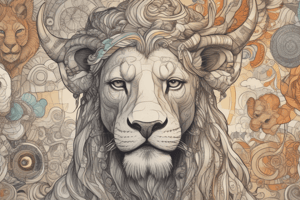Podcast
Questions and Answers
What aspect of a person does personality primarily capture?
What aspect of a person does personality primarily capture?
- Physical appearance
- Socioeconomic status
- Unique combination of characteristics (correct)
- Educational background
Which of the following is NOT considered a determinant of personality?
Which of the following is NOT considered a determinant of personality?
- Cultural factors
- Environmental influences
- Intelligence level (correct)
- Situational factors
Who among the following is NOT associated with the development of the ‘Big Five’ personality theory?
Who among the following is NOT associated with the development of the ‘Big Five’ personality theory?
- Sigmund Freud (correct)
- McCrae & Costa
- D.W. Fiske
- Goldberg
Which of the following best describes the concept of 'Extraversion' in the context of the 'Big Five' personality traits?
Which of the following best describes the concept of 'Extraversion' in the context of the 'Big Five' personality traits?
How is the relationship between personality and work behavior characterized?
How is the relationship between personality and work behavior characterized?
Which Big 5 personality trait is associated with better performance in the workplace?
Which Big 5 personality trait is associated with better performance in the workplace?
What is a potential downside of high conscientiousness in a work setting?
What is a potential downside of high conscientiousness in a work setting?
High levels of which Big 5 trait could lead to riskier behaviors in the workplace?
High levels of which Big 5 trait could lead to riskier behaviors in the workplace?
Which trait is least likely to be positively associated with leadership effectiveness?
Which trait is least likely to be positively associated with leadership effectiveness?
In terms of job satisfaction, which Big 5 trait contributes the most?
In terms of job satisfaction, which Big 5 trait contributes the most?
Which of the following statements is most accurate regarding the Big 5 personality traits?
Which of the following statements is most accurate regarding the Big 5 personality traits?
Which Big 5 trait may help a nurse be more adaptable in similar work situations?
Which Big 5 trait may help a nurse be more adaptable in similar work situations?
What characteristics are typically associated with high levels of agreeableness in the workplace?
What characteristics are typically associated with high levels of agreeableness in the workplace?
What does a high internal locus of control indicate about an individual's beliefs?
What does a high internal locus of control indicate about an individual's beliefs?
Which of the following attributes are associated with individuals who have an external locus of control?
Which of the following attributes are associated with individuals who have an external locus of control?
What is a common characteristic of individuals with a high external locus of control in a crisis situation?
What is a common characteristic of individuals with a high external locus of control in a crisis situation?
Which type of individual is more likely to be described as achievement-oriented?
Which type of individual is more likely to be described as achievement-oriented?
What are individual differences NOT generally considered to include?
What are individual differences NOT generally considered to include?
Which of the following impacts how one perceives others and themselves?
Which of the following impacts how one perceives others and themselves?
What best describes an employee with an external locus of control in an organizational setting?
What best describes an employee with an external locus of control in an organizational setting?
The belief that rewards are a direct result of personal behavior is associated with which locus of control?
The belief that rewards are a direct result of personal behavior is associated with which locus of control?
Why are individual differences considered important in an organization?
Why are individual differences considered important in an organization?
In terms of locus of control, how do individuals with internal beliefs tend to handle change?
In terms of locus of control, how do individuals with internal beliefs tend to handle change?
Flashcards
Personality
Personality
The unique and consistent pattern of thoughts, feelings, and behaviors that make up an individual.
Personality Determinants
Personality Determinants
Factors that influence how an individual's personality develops, including genetics, environment, culture, and social experiences.
The Big Five Personality Traits
The Big Five Personality Traits
A widely accepted framework that categorizes personality into five broad dimensions: Openness, Conscientiousness, Extraversion, Agreeableness, and Neuroticism.
Internal Locus of Control
Internal Locus of Control
Signup and view all the flashcards
External Locus of Control
External Locus of Control
Signup and view all the flashcards
Personality and Work Behavior
Personality and Work Behavior
Signup and view all the flashcards
Openness
Openness
Signup and view all the flashcards
Conscientiousness
Conscientiousness
Signup and view all the flashcards
Extraversion
Extraversion
Signup and view all the flashcards
Agreeableness
Agreeableness
Signup and view all the flashcards
Neuroticism (Emotional Stability)
Neuroticism (Emotional Stability)
Signup and view all the flashcards
Positive and Negative Sides of Big Five Traits
Positive and Negative Sides of Big Five Traits
Signup and view all the flashcards
The Big Five Traits and Work Behavior
The Big Five Traits and Work Behavior
Signup and view all the flashcards
Personality Across Time
Personality Across Time
Signup and view all the flashcards
Individual Differences
Individual Differences
Signup and view all the flashcards
Importance of Individual Differences
Importance of Individual Differences
Signup and view all the flashcards
Cultural Factors
Cultural Factors
Signup and view all the flashcards
Social Factors
Social Factors
Signup and view all the flashcards
Situational Factors
Situational Factors
Signup and view all the flashcards
Personality Variations
Personality Variations
Signup and view all the flashcards
Understanding Others' Personalities
Understanding Others' Personalities
Signup and view all the flashcards
Personality and Workplace Relationships
Personality and Workplace Relationships
Signup and view all the flashcards
Personality and Career Development
Personality and Career Development
Signup and view all the flashcards
Study Notes
Personality
- Personality is a combination of characteristics that describe how an individual reacts and interacts with others.
- Personality can also be described as a pattern of enduring ways in which a person feels, thinks, and behaves.
Personality Determinants
- Personality is determined by heredity (nature) and environment (nurture).
- Environmental factors influencing personality include: cultural factors, social factors, and situational factors.
- The debate about nature vs nurture focuses on determining how much of personality is inherited.
The Big Five Personality Traits
- The Big Five personality traits were developed by several researchers including: D.W.Fiske, Norman, Smith, Goldberg, and McCrae & Costa.
- The Big Five traits are: Openness, Conscientiousness, Extraversion, Agreeableness, and Neuroticism.
Personality and Work Behaviour
- The relationship between personality and work behavior depends on the nature of the work.
- Personality traits become important when considering the different personality traits needed for successful work in various roles.
Locus of Control
- Locus of Control was proposed by Julian Rotter (1966).
- The theory describes two main categories of Locus of Control: Internal and External.
- Internal Locus of Control: People believe that they are in control of their own lives and that their actions have a direct impact on outcomes.
- External Locus of Control: People believe that external factors, such as fate, chance, or luck, determine outcomes.
Locus of Control and Work Behaviour
- Internal Locus of Control: Those with an Internal Locus of Control are more likely to be independent, self-empowered, and prefer to negotiate change.
- External Locus of Control: Those with an External Locus of Control are more likely to be compliant, conforming, and prefer to be told what to do.
Locus of Control and Crisis Situations
-
Internal Locus of Control: In crisis situations, those with an Internal Locus of Control tend to accept responsibility for their actions and decisions, think independently, and try to resolve problems before escalation.
-
External Locus of Control: In crisis situations, those with an External Locus of Control tend to be fatalistic, blame others, and avoid taking responsibility.
Individual Differences
- Individual differences include physical qualities, demographic differences, abilities, skills, and personality.
- Understanding individual differences is important because it helps determine the qualities needed to succeed in different roles.
Positive and Negative Sides of Big Five Traits
-
Openness:
- Positive: Increased learning, more adaptable to change.
- Negative: Easily bored with routine tasks.
-
Conscientiousness:
- Positive: Disciplined, tend to live longer.
- Negative: Don't adapt easily to change, longer learning curves.
-
Extraversion:
- Positive: Emotionally expressive.
- Negative: Impulsive, risky behaviors.
-
Agreeableness:
- Positive: Better liked, rule abiding, less likely to engage in deviant behavior.
- Negative: Poor negotiators.
-
Emotional Stability:
- Positive: Less health complaints, less hyper vigilant, less negative thinking.
- Negative: Can take unnecessary risks.
The Big Five Traits and Work Behavior
-
Performance: Conscientiousness, extraversion, and openness are associated with better performance.
-
Happiness/Satisfaction: Emotional stability, extraversion, and agreeableness are associated with greater work happiness and satisfaction.
-
Leadership: Extroversion, conscientiousness, and openness are associated with leadership potential.
Personality Across Time
- Personality traits tend to stabilize over time.
Summary
- People are fundamentally the same but also have unique differences.
- Individual differences are a product of biology and experiences.
- Some individual differences are associated with specific work outcomes.
- Some individual differences are more stable than others.
Studying That Suits You
Use AI to generate personalized quizzes and flashcards to suit your learning preferences.




